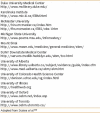What should urologists know about evidence-based medicine?
- PMID: 22279325
- PMCID: PMC3263227
- DOI: 10.4103/0970-1591.91448
What should urologists know about evidence-based medicine?
Abstract
Objectives: This article outlines the basic principles of evidence-based medicine (EBM) and provides urologists with some tools to further explore, understand, and work with EBM.
Materials and methods: A narrative review was conducted illustrating several aspects of EBM.
Results: Based on the definition of EBM, the aspects of evidence are clarified and a systematic approach is presented for integrating the evidence with individual patient values and circumstances. Next, sources for finding the best evidence are described and misconceptions about EBM are corrected. Finally, the current state of EBM in urology is discussed.
Conclusions: It is clear that EBM will have an increasing relevance for urologists. Therefore, it is essential that all urologists have an understanding of the fundamental principles of EBM.
Keywords: Evidence-based medicine; integrating evidence in to clinical practice; urology.
Conflict of interest statement
Figures
References
-
- Sackett DL, Straus SE, Richardson WS, Rosenberg W, Haynes RB. Philadelphia USA: Churchill Livingstone; 2000. Evidence-Based Medicine.
-
- Guyatt GH, Rennie D The Evidence-Based Medicine Working Group. A Manual for Evidence-Based Clinical Practice. Chicago: AMA press; 2002. Users’ Guides to the Medical Literature.
-
- Petrisor BA, Keating J, Schemitsch E. Grading the evidence: Levels of evidence and grades of recommendation. Injury. 2006;37:321–7. - PubMed
-
- Begg C, Cho M, Eastwood S, Horton R, Moher D, Olkin I, et al. Improving the quality of reporting of randomized controlled trials. The CONSORT statement. JAMA. 1996;276:637–9. - PubMed




